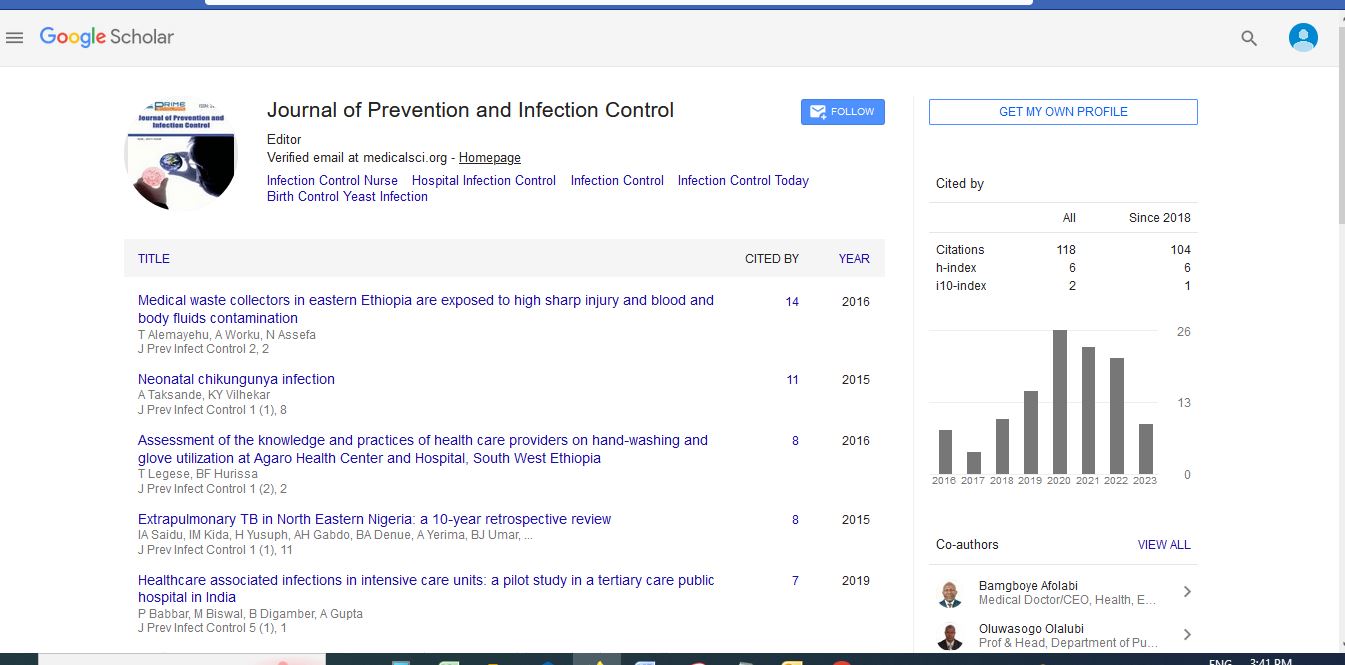Perspective - (2023) Volume 9, Issue 4
Understanding Non-Communicable Diseases and Conditions: A Global Health Challenge
Akshya Strandey*
Department of Science, University of California, USA
*Correspondence:
Akshya Strandey,
Department of Science, University of California,
USA,
Email:
Received: 29-Nov-2023, Manuscript No. IPJPIC-23-18551 ;
Editor assigned: 01-Dec-2023, Pre QC No. IPJPIC-23-18551 (PQ);
Reviewed: 15-Dec-2023, QC No. IPJPIC-23-18551 ;
Revised: 20-Dec-2023, Manuscript No. IPJPIC-23-18551 (R);
Published:
27-Dec-2023, DOI: 10.36648/2471-9668-9.4.36
Introduction
Non-Communicable Diseases (NCDs) constitute a formidable
health crisis globally, posing a significant burden on individuals,
healthcare systems, and economies. NCDs encompass a broad
spectrum of chronic diseases and conditions that are not transmitted
from person to person. These ailments, often characterized
by prolonged durations and slow progression, include cardiovascular
diseases, cancer, chronic respiratory diseases, and
diabetes. As their prevalence continues to rise, understanding,
preventing, and managing NCDs stands as a pivotal challenge in
modern healthcare. The global prevalence of NCDs has surged
over the past few decades, significantly impacting populations
across all demographics. Lifestyle changes, urbanization, sedentary
behaviours, and dietary shifts contribute to the escalating
incidence of these diseases. Cardiovascular diseases, accounting
for a significant portion of NCD-related deaths, encompass conditions
like heart attacks and strokes. Cancer, with its multifaceted
nature, presents diverse challenges in detection, treatment,
and prevention. Chronic respiratory diseases such as Chronic
Obstructive Pulmonary Disease (COPD) and asthma pose persistent
threats, while diabetes remains a growing concern due to
its prevalence and long-term health implications. Several modifiable
risk factors contribute to the development of NCDs. Unhealthy
diets high in processed foods, physical inactivity, tobacco
use, harmful alcohol consumption, and environmental factors
stand as key determinants. Addressing these risk factors is crucial
in formulating effective prevention strategies. Promoting healthier
lifestyles, encouraging regular physical activity, advocating for
tobacco control measures, and implementing policies that support
access to nutritious food are imperative steps in curbing the
prevalence of NCDs.
Description
Managing NCDs presents multifaceted challenges. Access to
healthcare services, affordability of treatments, and the complexities
associated with long-term care pose significant hurdles.
Early detection through screenings, diagnostic tools, and
effective management plans are essential. However, disparities
in healthcare access, especially in underserved communities, exacerbate
these challenges, leading to delayed diagnosis and suboptimal
care. The battle against NCDs necessitates a concerted
global effort. International organizations, governments, healthcare
providers, and civil societies collaborate to formulate comprehensive
strategies. Initiatives such as the WHO Global Action
Plan for the Prevention and Control of NCDs outline frameworks
for action, emphasizing prevention, treatment, and monitoring.
Advocacy for policy changes, investment in research, and fostering
partnerships across sectors are crucial in addressing the multifaceted
nature of NCDs.
As the prevalence of NCDs continues to escalate, a holistic approach
encompassing prevention, early detection, and effective
management is imperative. Education and awareness campaigns,
coupled with policy interventions, hold the key to mitigating the
burden of NCDs.
Conclusion
Non-Communicable Diseases and conditions stand as a formidable
global health crisis, necessitating multifaceted strategies and
concerted efforts. Addressing the risk factors, improving access
to healthcare, and fostering global collaboration are imperative
in mitigating the burden imposed by these chronic ailments. As
we navigate the complexities of modern healthcare, investing in
preventive measures and prioritizing NCD management will be
crucial in building healthier, resilient communities worldwide.
Beyond their toll on individual health, NCDs exert a significant
socioeconomic burden. These diseases not only incur substantial
healthcare costs but also lead to productivity losses due to
disability and premature mortality. The economic ramifications
ripple through societies, affecting families, communities, and national
economies. Particularly in low- and middle-income countries,
the strain imposed by NCDs on healthcare systems amplifies
existing challenges, posing a barrier to overall development.
Citation: Strandey A (2023) Understanding Non-communicable Diseases and Conditions: A Global Health Challenge. J Prevent Infect Control. 9:36.
Copyright: © 2023 Strandey A. This is an open-access article distributed under the terms of the Creative Commons Attribution License, which permits unrestricted use, distribution, and reproduction in any medium, provided the original author and source are credited.

